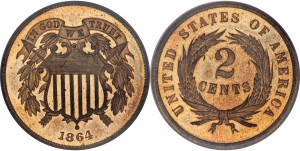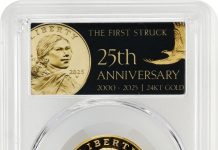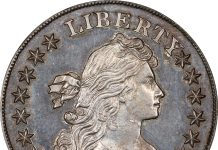Americans can breathe easier as the new year begins.
The House of Representatives has passed a non-binding resolution reaffirming “In God We Trust” as the national motto.
I hadn’t been aware that the motto was in danger of being displaced. But then, that’s why we send our hard-working congressmen toWashington—to vigilantly safeguard the values that really matter for citizens who are sidetracked by such mundane concerns as saving their homes and finding jobs.
Let me stipulate at the outset that I am not an atheist and I’ve never found fault with the choice of “In God We Trust” as our national motto—even in the years when that status was informal, before being made official in 1956.
I do find it puzzling why so many of my countrymen get positively rabid at the slightest perceived affront to this inscription, flying into a rage before they’re even familiar with the facts—as happened several years ago when angry critics, including Sarah Palin, denounced the motto’s omission from the presidential dollars. It was there all the time, of course, inscribed on the edge of the coins—except, ironically, on small numbers of error coins that lacked all edge inscriptions and were, as a result, worth hundreds of dollars apiece as collector’s items.
Frankly, if the choice had been mine, I would have favored “Liberty” as this nation’s official motto. More than trust in God, the thirst for freedom was the motivating force that impelled the Founding Fathers to break with Mother England and start the American Revolution.
Speaking of those heroic Founding Fathers, there’s a common misconception that the motto “In God We Trust” dates back to the very beginning ofU.S.independence, when George Washington, Thomas Jefferson and other magnificent leaders transformed the 13 colonies into the building blocks of the greatest nation on Earth.
As most coin collectors are aware, the motto didn’t make its first official appearance until 1864—three-quarters of a century after the federal government first got down to business in 1789. It was not an appeal for divine intervention in the fight for independence, but rather an expression of strong religious fervor arising from repugnance at the horrors of the bloody Civil War.
From the outset, the motto has been identified closely withU.S.coinage. That’s because it made that first appearance on the two-cent piece and eventually came to be used—and required—on everyU.S.coin. The requirement was extended toU.S.paper money in 1955.
I’ve argued through the years that the mediocre designs of modernU.S.coins stem, at least in part, from the space limitations imposed by the many inscriptions they’re legally required to display. In this context, “In God We Trust” contributes to their often cluttered appearance.
There’s no chance, of course, that these particular words will ever be removed from any of our coins—or paper money, either—with so many ardent supporters ready to spring at once to their defense. Nor am I suggesting that this should be done.
But some way should be found to trim the thicket of verbiage that’s cloggingU.S.coins and taking up space that could otherwise be devoted to bigger—and hopefully better—artwork.
It would be unthinkable to do away with “Liberty.” Besides being long on significance, it’s short in length and takes up little space. But surely we could dispense with “E Pluribus Unum.” Many Americans don’t even know what it means (“Out of many, one”), and it neither stirs the emotions nor provides essential information. Besides, “E Pluribus Unum” is just another way of saying “United States of America”—and that, too, already appears on every one of our coins.
“Liberty,” “In God We Trust,” “United States of America,” the coin’s denomination and the date. That’s more than enough inscriptions to squeeze into the space available on mostU.S.coins.
An alternative would be to move some inscriptions to the edge—but that would entail added costs and it’s causing complications with the presidential dollars even now.
In any case, I hope the Mint can come up with a solution on its own. God help us all if Congress gets into the act.












